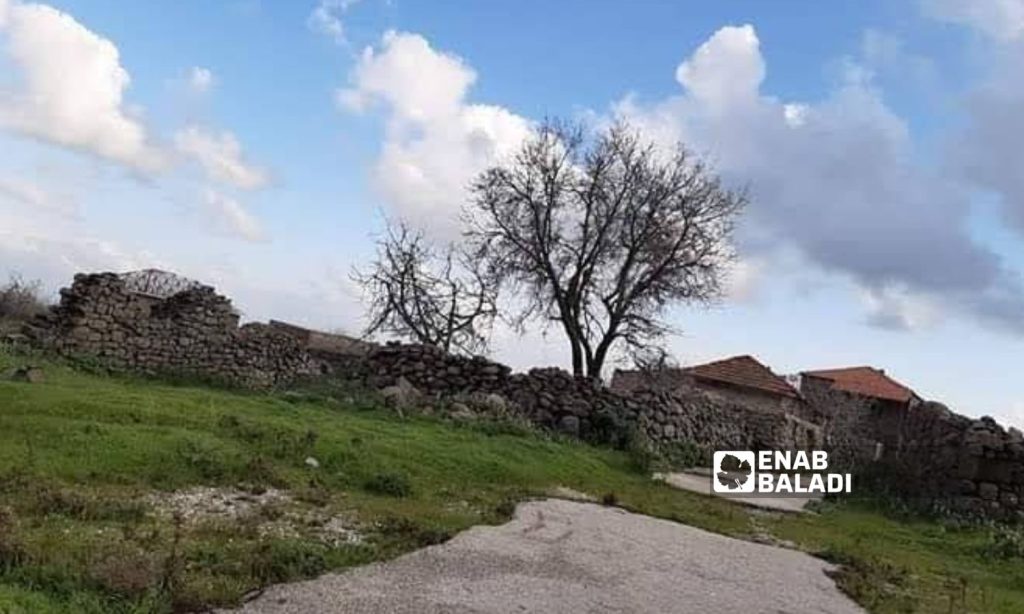Quneitra – Zain al-Jolani
The efforts of the regime’s government in the southern Quneitra governorate focused on securing services in the town of Braiqa, to the neglect of villages and towns whose residents whom Enab Baladi interviewed considered that their towns and villages had been neglected, while Braiqa was flooded with services, since the secretary of the Baath party branch in the province, Khaled Abaza, hails from it.
Braiqa, in the southern countryside, was suffering from poor services, as was the case with the rest of the villages and towns of Quneitra before the regime took control of southern Syria in mid-2018.
The services began to return to Braiqa alone, as it was the first town to be reached by the electricity network, and maintenance of the water and sanitation networks was carried out, and the telephone exchange was reoperated in it.
The presence of many neighboring villages and towns, which are only a few kilometers away from Braiqa, which have not received the most basic services until today, such as the electricity or water network, or even returning the people to them, prompted the people to consider what is happening as a result of nepotism of the branch secretary and the commander of the paramilitary National Defense Forces in Quneitra, Khaled Abaza.
Aid and relief too
Braiqa did not account for government services only, but organizations directed towards it with their relief services and even restoration activities.
Since 2018, most of the town’s residents have received assistance to restore their homes, and water and electricity services have also reached them, in addition to development projects for the people and service projects for street lighting and road rehabilitation and restoration.
Mousa, 50, of Rwaihina town, who refused to reveal his full name for security reasons, told Enab Baladi that his town contains an almost completely destroyed school, in addition to many destroyed houses due to the regime’s bombing of the area over the years.
While the efforts of the regime’s organizations and government agencies are focused on the town of Braiqa, the rest of the villages and towns of Quneitra did not receive any services, or even afforestation campaigns, according to Mousa.
He added, “We want to rebuild the school because our children travel long distances daily to reach schools in neighboring villages.”
Mousa considered that his town did not receive services, as it does not have a secretary for the Baath party branch, nor even a member of the branch’s leadership, in reference to Khaled Abaza.
Political position is a reason
A resident of the town of Mashara in the central countryside of Quneitra said that his town also did not receive any services.
Ahmed, 40, who withheld his full name for security reasons, says that the institutions of the Syrian regime deal with the villages and towns of Quneitra based on the (political) position of their people on the Syrian revolution.
He added that he had previously lived in Braiqa during the opposition’s control over the area since his town was a front line between the regime forces and the opposition factions for years, and living there was not possible.
“Even during that period, the local council in Braiqa was receiving all its allocations of medical, food, and service support, despite the fact that the town was outside the influence of the Syrian regime,” he added.
Ahmed considered that the regime punishes the towns whose residents joined the “Free Army” factions early on, including his town Mashara, as its residents are not even entitled to demand services, adding that relief organizations have not entered most of the governorate’s towns for years.
Quneitra, along with the southern governorates, suffers from deteriorating living conditions, in addition to a state of security chaos in it, which was reinforced by the people of the region’s refusal of the presence of the Syrian regime there after it had been out of its influence for about six years.
Quneitra governorate extends over an area of 1,800 square kilometers, of which Israel occupies two-thirds, and dozens of villages are distributed in it.
Based on the 2019 estimates, the regime’s Central Bureau of Statistics indicates that the population of Quneitra is 117,000 people, while a study on “Regional Development in Quneitra governorate” stated that the population, including displaced people, amounted to 475,000 people in 2009.

